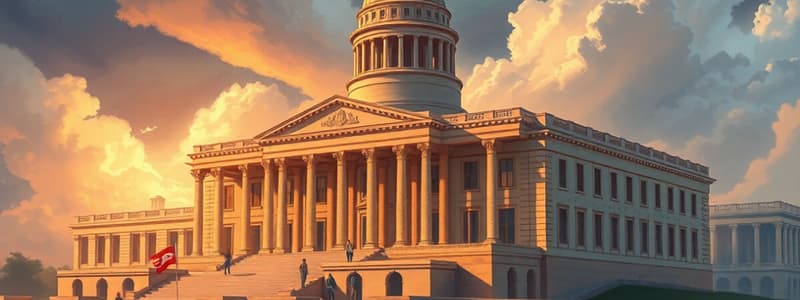Podcast
Questions and Answers
What clause establishes the federal government's superiority over state governments?
What clause establishes the federal government's superiority over state governments?
- Supremacy Clause (correct)
- State Clause
- Constitutional Clause
- Federal Clause
Which branch of government is responsible for making laws?
Which branch of government is responsible for making laws?
- Executive Branch
- Judicial Branch
- Sovereign Branch
- Legislative Branch (correct)
What term best describes a government where citizens elect their representatives?
What term best describes a government where citizens elect their representatives?
- Oligarchy
- Republic (correct)
- Democracy
- Monarchy
What process allowed the American people to accept or reject the Constitution?
What process allowed the American people to accept or reject the Constitution?
Which term describes the principle of shared power between the national and state governments?
Which term describes the principle of shared power between the national and state governments?
What was one of the main weaknesses of the Articles of Confederation regarding taxation?
What was one of the main weaknesses of the Articles of Confederation regarding taxation?
What motivated Americans to consider fixing or replacing the Articles of Confederation?
What motivated Americans to consider fixing or replacing the Articles of Confederation?
Which plan proposed at the Constitutional Convention favored larger states in terms of representation?
Which plan proposed at the Constitutional Convention favored larger states in terms of representation?
What was a significant concern of the Anti-Federalists regarding the new Constitution?
What was a significant concern of the Anti-Federalists regarding the new Constitution?
How did the New Jersey Plan propose to determine representation in Congress?
How did the New Jersey Plan propose to determine representation in Congress?
What are reserved powers?
What are reserved powers?
What is a Constitutional Convention?
What is a Constitutional Convention?
What structure did the U.S. Constitution create for the legislature?
What structure did the U.S. Constitution create for the legislature?
What was one major argument by Anti-Federalists against the Constitution?
What was one major argument by Anti-Federalists against the Constitution?
What is the Elastic Clause in the Constitution?
What is the Elastic Clause in the Constitution?
What was a key feature that Americans wanted included in a proper constitution?
What was a key feature that Americans wanted included in a proper constitution?
What did the Land Ordinance of 1785 establish?
What did the Land Ordinance of 1785 establish?
Which of the following was NOT a major flaw in the Articles of Confederation?
Which of the following was NOT a major flaw in the Articles of Confederation?
How did Madison believe constitutions could shape human nature?
How did Madison believe constitutions could shape human nature?
What was the purpose of the Northwest Ordinance of 1787?
What was the purpose of the Northwest Ordinance of 1787?
What was the main outcome of the Great Compromise?
What was the main outcome of the Great Compromise?
What did the 3/5 Compromise establish regarding representation?
What did the 3/5 Compromise establish regarding representation?
Which criticism did the Anti-Federalists NOT raise about the Constitution?
Which criticism did the Anti-Federalists NOT raise about the Constitution?
Which agreement allowed the importation of enslaved people to continue until 1808?
Which agreement allowed the importation of enslaved people to continue until 1808?
What was the main purpose of the Federalist Papers?
What was the main purpose of the Federalist Papers?
Flashcards
Federalism
Federalism
The principle of dividing power between the national government and the states.
Supremacy Clause
Supremacy Clause
The section of the Constitution that establishes the supremacy of federal law over state law.
Republic
Republic
A government in which citizens elect representatives to make decisions for them.
Sovereign
Sovereign
Signup and view all the flashcards
Delegated Powers
Delegated Powers
Signup and view all the flashcards
Reserved Powers
Reserved Powers
Signup and view all the flashcards
Constitutional Convention
Constitutional Convention
Signup and view all the flashcards
Bicameral Legislature
Bicameral Legislature
Signup and view all the flashcards
Anti-Federalist Argument Against the Constitution
Anti-Federalist Argument Against the Constitution
Signup and view all the flashcards
Elastic Clause
Elastic Clause
Signup and view all the flashcards
Weakness of the Articles of Confederation
Weakness of the Articles of Confederation
Signup and view all the flashcards
Shays' Rebellion
Shays' Rebellion
Signup and view all the flashcards
The Virginia Plan
The Virginia Plan
Signup and view all the flashcards
Anti-Federalists
Anti-Federalists
Signup and view all the flashcards
Checks and balances
Checks and balances
Signup and view all the flashcards
Land Ordinance of 1785
Land Ordinance of 1785
Signup and view all the flashcards
Northwest Ordinance of 1787
Northwest Ordinance of 1787
Signup and view all the flashcards
Articles of Confederation
Articles of Confederation
Signup and view all the flashcards
Madison's view on human nature
Madison's view on human nature
Signup and view all the flashcards
Great Compromise
Great Compromise
Signup and view all the flashcards
3/5 Compromise
3/5 Compromise
Signup and view all the flashcards
Slave Trade Compromise
Slave Trade Compromise
Signup and view all the flashcards
Federalist Papers
Federalist Papers
Signup and view all the flashcards
Undemocratic Governance
Undemocratic Governance
Signup and view all the flashcards




